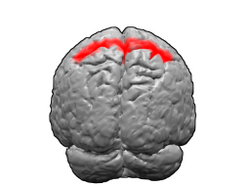Brodmann area 5
| Brodmann area 5 | |
|---|---|
 Image of brain with Brodmann area 5 shown in red | |
 Image of brain with Brodmann area 5 shown in orange | |
| Details | |
| Identifiers | |
| Latin | area praeparietalis |
| NeuroNames | 1015 |
| NeuroLex ID | birnlex_1736 |
| FMA | 68601 |
| Anatomical terms of neuroanatomy | |
Brodmann area 5 is one of Brodmann's cytoarchitectural defined regions of the brain. It is involved in somatosensory processing, movement[1][2] and association, and is part of the posterior parietal cortex.[3]
Human
[edit]Brodmann area 5 is a subdivision of the parietal cortex, part of the cortex in the human brain. BA5 is part of the superior parietal lobule and part of the postcentral gyrus. It is situated immediately posterior to the primary somatosensory cortex.[4]
It is bounded cytoarchitecturally by Brodmann area 2, Brodmann area 7, Brodmann area 4, and Brodmann area 31.[4]
Monkey
[edit]In guenon Brodmann area 5 is a subdivision of the parietal lobe defined on the basis of cytoarchitecture. It occupies primarily the superior parietal lobule. Brodmann-1909 considered it topologically and cytoarchitecturally homologous to the preparietal area 5 of the human. Distinctive features (Brodmann-1905): compared to area 4 of Brodmann-1909 area 5 has a thick self-contained internal granular layer (IV); lacks a distinct internal pyramidal layer (V); has a marked sublayer 3b of pyramidal cells in the external pyramidal layer (III); has a distinct boundary between the internal pyramidal layer (V) and the multiform layer (VI); and has ganglion cells in layer V beneath its boundary with layer IV that are separated from layer VI by a wide clear zone.[5]
In the macaque monkey the area PE corresponds to BA5.[6]
Additional images
[edit]-
Animation
-
Lateral view
-
Medial view
-
Posterior view
See also
[edit]References
[edit]- ^ MacKenzie, T. N.; Bailey, A. Z.; Mi, P. Y.; Tsang, P.; Jones, C. B.; Nelson, A. J. (2016). "Human area 5 modulates corticospinal output during movement preparation". NeuroReport. 27 (14): 1056–60. doi:10.1097/WNR.0000000000000655. PMID 27508980. S2CID 35261721.
- ^ Lacquaniti, F.; Guigon, E.; Bianchi, L.; Ferraina, S.; Caminiti, R. (1995). "Representing spatial information for limb movement: Role of area 5 in the monkey". Cerebral Cortex. 5 (5): 391–409. doi:10.1093/cercor/5.5.391. PMID 8547787.
- ^ Whitlock, Jonathan R. (2017-07-24). "Posterior parietal cortex". Current Biology. 27 (14): R691–R695. doi:10.1016/j.cub.2017.06.007. hdl:11250/2465681. ISSN 0960-9822. PMID 28743011.
- ^ a b "BrainInfo". braininfo.rprc.washington.edu.
- ^
 This article incorporates text available under the CC BY 3.0 license. "BrainInfo". Archived from the original on December 7, 2013. Retrieved December 3, 2013.
This article incorporates text available under the CC BY 3.0 license. "BrainInfo". Archived from the original on December 7, 2013. Retrieved December 3, 2013.{{cite web}}: CS1 maint: bot: original URL status unknown (link) - ^ M.-P. Deiber; R. E. Passingham; J. G. Colebatch; K. J. Friston; P. D. Nixon; R. S. J. Frackowiak (1991). "Cortical area and the selection of movement: a study with positron emission tomography". Experimental Brain Research. 84 (2): 393–402. doi:10.1007/BF00231461. PMID 2065746. S2CID 7239037.
External links
[edit]- Visit BrainInfo for Neuroanatomy of this area
- Brodmann area 5 in the Brede Database at the Technical University of Denmark




